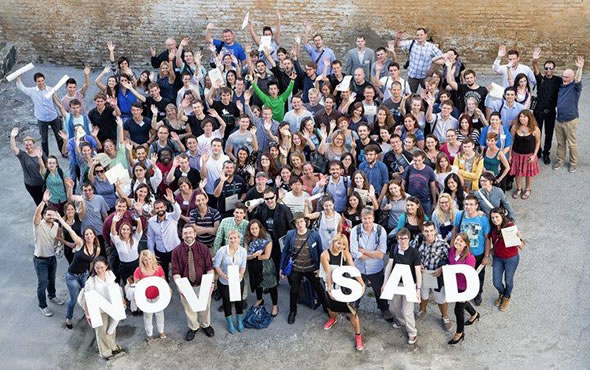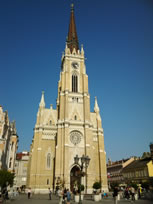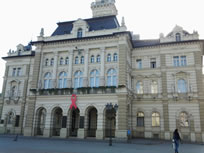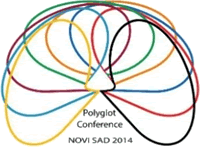Here’s a recording in a mystery language.
Can you identify the language, and do you know where it’s spoken?
Here’s a recording in a mystery language.
Can you identify the language, and do you know where it’s spoken?
Last night at choir one of the songs we were singing ended with the line “in the mor-ning”, with the mor and ning of morning clearly separated and on different notes. One of the tenors made a joke that we needed more ning in the morning, which appealed to me, and I wondered what ning might be and why we’d need more of it. I also wondered if ning is a word in any other language, and what it might mean.
So we need more ning in the morning and evening when lightning is adorning the darkening sky, and warnings of yawning are lessening.
For more nings see: http://www.rhymer.com/RhymingDictionaryLast/morning.html
There are a number of nings in Mandarin Chinese:
– 拧 [擰] (níng) = to twist; wring; pinch; tweak
– 凝 (níng) = to congeal
– 宁 [寧] (níng) = peaceful; tranquil
– 狞 [獰] (níng) = ferocious (of facial expression), as in (níngxiào) = sardonic smile
– 拧 [擰] (nǐng) = to screw; differ; disagree
– 宁 [寧] (nìng) = rather; would rather; surname
– 佞 (nìng) = to flatter; toady
– 拧 [擰] (nìng) = pigheaded
– 泞 [濘] (nìng) = muddy
What about in other languages?

Yesterday morning I shared a taxi to Belgrade airport with two other conference participants. We had some lunch while waiting for our flights, and came across quite a few other polyglots. I flew via Zurich and had a short connection time there – only 20 minutes. There was a bit longer to wait for my train from Manchester airport, so I had something to eat.
It was warm and sunny for the whole time I was in Serbia, but it was cold, wet and windy back in the UK. In fact we were flying over solid cloud cover across most of France and England. Fortunately there were some good views for the rest of the flights.
The announcements on the planes were in Swiss German, English and Serbian. I also heard a number of other languages on the journey, including Hindi, Italian, Spanish and possibly Yiddish.
Here’s a recording in a mystery language.
Can you identify the language, and do you know where it’s spoken?

Yesterday morning I met up with other conference participants and after a bit of a wander around the city, we had lunch then went to the opening ceremony a reception. In the after we had a little guided tour of Novi Sad seeing some interesting buildings, including the Catholic or Orthodox Cathedrals, and the fortress. There are some rather attractive buildings here, wide, pedestrianised café-lined streets, some nice parks and generally a relaxed kind of atmosphere.
In the evening we all went to a restaurant about 4 or 5km from the city centre for dinner. I walked there with a few others, and the rest went by bus or taxi. We had a nice dinner with lots of polyglot chat, then some people started dancing, and others carried on chatting.

Today there were lectures and talks on a variety of topics including sound symbolism, the magic of metaphors, language coaching, and acting and humour in a foreign language.
So far I’ve had conversations in about 10 languages and spoken bits and pieces of maybe 10 others. In some cases this was only a few words (all I know), in others it was a bit more. There are even two guys here who are learning Scottish Gaelic, one of whom also speaks a bit of Manx, and another who is learning Irish.
There are various polyglot activities scheduled for this afternoon and evening, and talks and lectures start tomorrow, so I have this morning free. I plan to do a bit of work on Omniglot, and will try to meet up with other people who are here for the conference.
Unlike in Berlin, where most people stayed in a large hostel and the polyglot gathering was in the same place, here in Novi Sad things are a bit more spread out – we are staying in various hotels around the city and the conference is taking place in a cultural centre. My hotel doesn’t have a restaurant and breakfast is available at a café round the corner.
It seems that smoking is permitted inside in some places here – ugh! Since the smoking ban came into force in the UK I’ve tried to avoid visiting places where indoor smoking is still allowed. I didn’t check before coming here and might not have come if I’d known. At least the weather is warm and sunny so I can sit outside and avoid most of the smoke.
I’ve spoken a bit of Serbian so far, and found that some people in hotels and restaurants speak English as well. Last night I shared a taxi from Belgrade to Novi Sad with one of the other conference participants – a Polish guy with Vietnamese roots. We talked mainly in French, with a bit of Spanish, English and Russian thrown in for good measure. The taxi driver spoke only Serbian, plus a bit of Russian and German, and I struggled to explain to him that one of the people who was supposed to be with us had missed his connection in Zurich, due to a delayed flight from London, and would be arriving later.

Tomorrow I’m off to a polyglot conference in Novi Sad in Serbia. It will be my first visit to Serbia, and my first opportunity to speak Serbian – I’ve been learning a bit more or less every day for the past month or so, but have yet to use it, so it’ll be interesting to find out how much I can say and understand. I’ll get to speak many other languages as well, and am really looking forward to it.
Are any of you going to the conference?
I went to a poetry recital last night featuring Nia Davies, a Welsh/English poet who lives in Wales, and Hu Dong, a Chinese poet who lives in England. It was part of the North Wales International Poetry Festival. Nia’s poems were all in English, and Hu Dong’s were in Sichuanese, with English and Welsh translations.
Nia read a series of interesting poems based on really long words in various languages, or at least on their English definitions. She was inspired to write the first of these after discovering the Turkish word Çekoslavakyalılaştıramadıklarımızdansınız? (Are you one we couldn’t Czechoslavakianize?) while learning Turkish. She then looked for similarly long words in other languages, and wrote poems about some of them.
While listening to the long word-based poems I was trying to think up with a suitably long word to describe such activity. I came up with sesquipedalogology, which combines sesquipedalian ([of a word] polysyllabic; long; characterized by long words; long-winded), and logology (originally the science of word studies, but now the field of recreational linguistics, particularly word games).
Another interesting word that came up was metrophobia, the fear of poetry, which was the theme of one of the poems.
The English translations of long words in other languages can be quite poetic – a kind of found poetry. In fact you can take definitions from any monolingual dictionary and find poetry in them. Here are few from my English dicitonary:
elevenses, pl. n. Brit. informal
a light snack
usually tea or coffee
taken in mid-morning
elflock, n.
a lock of hair
fancifully regarded as having been
tangled by the elves
If you have a monolingual dictionary to hand, why not open it at random and see if you can find any interesting words and definitions.
Here’s a recording in a mystery language.
Can you identify the language, and do you know where it’s spoken?
The sandwich is named after the 4th Earl of Sandwich, John Montagu, who is reputed to have invented it as a convenient way to eat while playing cards. He didn’t come up with the idea of putting meat or filling between two slices of bread, but he certainly popularised it and gave it his title.
According to the QI* elves on the No Such Thing as a Fish podcast, the Earl would have preferred to be the Earl of Portsmouth, but someone else got that title first. If he had got his wish, we might be eating portsmouths rather than sandwiches.
Do you know of any other interesting stories attached to foodstuffs, items of clothing or other things named after famous people?
*QI (Quite Interesting) is a quiz show on BBC TV.